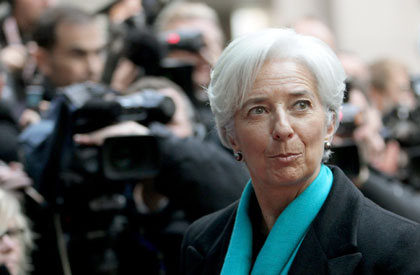Buyback of Greek government bonds, returning part of the profits from securities trading, reducing the interest rates on support loans and deferring their payments by 10 years are the conditions that Europe and the International Monetary Fund have agreed on in order to bring back the Greek debt to sustainable levels.
In particular, the lenders have agreed to defer the payments of interest rates on the loans from the European Financial Stability Facility (EFSF) by 10 years and extend the maturities of loans by 15 years. The European Central Bank will return to Greece part of the profits gained from the trading of Greek government bonds. It is only unknown for the time being how the European institution will buy back the Greek debt. The price at which the European Central Bank will buy the Greek debt is around 35% of its  nominal value.
nominal value.
"Taken together, these measures will help to bring back Greece’s debt ratio onto a sustainable path and facilitate a gradual return to market financing," the head of the International Monetary Fund Christine Lagarde said after long hours of meeting with the finance ministers of the eurozone. The overall effect of these measures will lead to a reduction of Greece’s foreign debts by 40 billion euro in the coming years.
The concessions the International Monetary Fund and Europe have agreed on in combination with the full implementation of the recovery programme are expected to help Greece reduce its debt to 124% of GDP in 2020. Two years later, it must fall to 110% of GDP. "This represents a major debt reduction for Greece relative to its current debt trajectory," said Lagarde adding that the agreement would allow her to recommend to the IMF Executive Board the completion of the first review of Greece’s programme.
International lenders decided to pay the bailout of 43.7 billion euro as well. It will be paid in instalments. The first instalment will be paid by 13 December this year. It will be worth 34.4 billion euro and will go primarily to bank recapitalization and to cover overdue domestic obligations. The remaining amount will be paid in three sub-tranches by the end of the first quarter of 2013.
"The decision of the Eurogroup and the International Monetary Fund is extremely important because it keeps Greece within the euro," Finance Minister Yiannis Stournaras said after the talks. It gives the country the opportunity to escape from the vicious circle of recession and excessive lending and reduces its debt, explained the minister.
In the early hours of Tuesday morning, after the meeting of international lenders, Prime Minister Antonis Samaras said, "Everything went well. We, the Greeks fought together and a new day for all of us will start tomorrow. We will present more details tomorrow."
The Prime Minister tries to present the lenders’ agreement as a success for Greece, but some foreign analysts estimate that it is too early to celebrate. The deepening recession and the difficulties in the implementation of the Greek programme make financiers believe that a temporary solution has been found. Greece will not get away without a second debt restructuring that is currently delayed by the parliamentary elections in Germany in the autumn of 2013.
Greek media greet with relief the agreement reached in Brussels. "Finally, there is a decision on the tranche and the debt" reads the home page of the online edition of Kathimerini newspaper. Ethnos paraphrases the comedy starring Marilyn Monroe The Seven Year Itch in order to describe the pain associated with the renegotiation of the Greek debt and the title reads "A compromise after 12 hour ... itch". Naftemporiki bets on the positive approach and reads "Satisfaction in the Government with the agreement." To Vima reports in big letters, "Eurogroup: an agreement between the EU and the IMF on the Greek debt" and Ta Nea reports in short "44 billion - the economy will take a breath."
"To be sure that this arrangement will work, we must first see the conditions under which the lenders provide that the debt will reach 110% of GDP in 2022. There is no way to know whether the debt will be sustainable after ten years if we do not know on what levels of GDP growth these results are based," a Greek financial analyst, who wished to remain anonymous, told GRReporter.
According to the same source, the first unofficial information suggests that lenders’ anticipations for the Greek economy are more than optimistic. If the Europeans and the International Monetary Fund set great hopes of strong economic growth in Greece after 2014 onwards, their accounts for the sustainability of their debt will not balance.
Another snake in the grass is the decision of the European Financial Stability Facility (EFSF) for the buyback of part of the Greek government bonds (Direct Debt Buyback). The European financial ministers have agreed to indirectly allocate 10 billion euro to buy Greek government bonds at a nominal value of 35 billion euro.
In other words, the European community has established a price of 35 cents for every euro of the Greek debt, which is based on assumptions. The price in turn is determined by the market and if the market value of Greek bonds was 30% below the nominal value until yesterday, the demand for them is growing now and with it, the price. This can lead to a second complication. If prices rise, Europe will not be able to buy back the Greek debt worth 35 billion euro with the 10 billion euro allocated and the debt sustainability will be put to the test again.